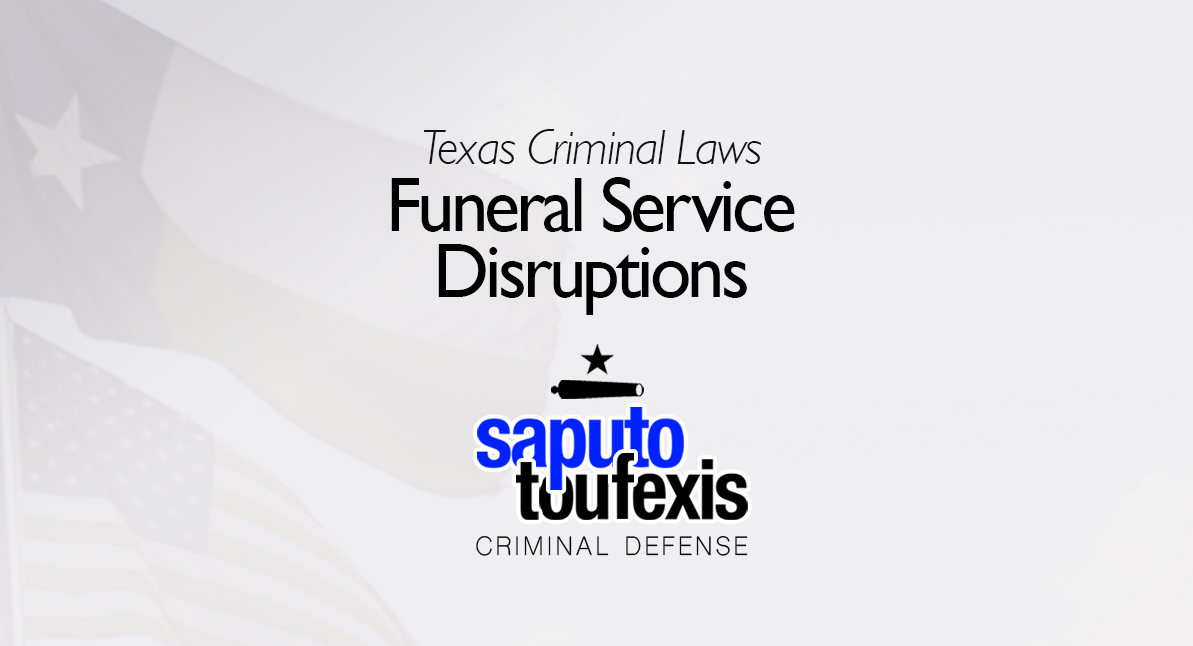The Texas Funeral Service Disruptions law gives police the right to arrest you if they believe you picketed within 1,000 feet of a cemetery or other facility three hours before and after a funeral.
FAQs about the
Funeral Service Disruptions law in Texas
- What is the current Texas law about Funeral Service Disruptions?
- What is the penalty for a Texas Funeral Service Disruptions offense?
- How can I be charged with a Funeral Service Disruptions offense in Texas?
- What is the statute of limitations for Funeral Service Disruptions in Texas?
- Can you get probation for Funeral Service Disruptions in Texas?
- What level of crime is Funeral Service Disruptions in Texas?
The Texas legislature codified this criminal offense in Texas Penal Code Section 42.055. The legislature did not update this law in 2025. In fact, this law has not been amended since 2011.
The Penal Code classifies the Texas Funeral Service Disruptions law under Title 9 “Offenses Against Public Order and Decency,” Chapter 42 “Disorderly Conduct and Related Offenses.” Learn more about the Texas offense of Funeral Service Disruptions below.
What is the current Texas law about Funeral Service Disruptions?
AV Preeminent Texas lawyer Paul Saputo provides the current law defining Funeral Service Disruptions in Penal Code Section §42.055, as follows:[1]
(b) A person commits an offense if, during the period beginning three hours before the service begins and ending three hours after the service is completed, the person engages in picketing within 1,000 feet of a facility or cemetery being used for a funeral service.
The offense is subject to the 42.04 free speech defense, requiring an order to disperse under certain circumstances.[2]
What is the penalty for a Texas Funeral Service Disruptions offense?
A conviction for Funeral Service Disruptions in Texas is punished as a Class B misdemeanor,[3] with a maximum possible fine of up to $2,000 and jail time of up to 180 days.
How can I be charged with a Funeral Service Disruptions offense in Texas?
You can be charged with Funeral Service Disruptions in Texas if the state’s attorneys believe that each of the elements of §42.055(b) as described in the section above have been met.
What is the statute of limitations for Funeral Service Disruptions in Texas?
As a misdemeanor, Funeral Service Disruptions charges have a two-year limitations period.[4]
Can you get probation for Funeral Service Disruptions in Texas?
The Texas Code of Criminal Procedure allows both judges and juries to grant probation for Funeral Service Disruptions, and judges are also allowed to accept deferred adjudication plea deals.[5]
What level of crime is Funeral Service Disruptions in Texas?
The Penal Code classifies Funeral Service Disruptions as a Class B misdemeanor.
Learn more about the penalty range for this offense in the section above.
Legal References:
^1. Texas Penal Code §42.055. This law is current as of 2025.^2. Texas Penal Code §42.04
(a) If conduct that would otherwise violate Section 42.01(a)(5) (Unreasonable Noise), 42.03 (Obstructing Passageway), or 42.055 (Funeral Service Disruptions) consists of speech or other communication, of gathering with others to hear or observe such speech or communication, or of gathering with others to picket or otherwise express in a nonviolent manner a position on social, economic, political, or religious questions, the actor must be ordered to move, disperse, or otherwise remedy the violation prior to his arrest if he has not yet intentionally harmed the interests of others which those sections seek to protect.
(b) The order required by this section may be given by a peace officer, a fireman, a person with authority to control the use of the premises, or any person directly affected by the violation.
(c) It is a defense to prosecution under Section 42.01(a)(5), 42.03, or 42.055:
(1) that in circumstances in which this section requires an order no order was given;
(2) that an order, if given, was manifestly unreasonable in scope; or
(3) that an order, if given, was promptly obeyed.
^3. Texas Penal Code Section §42.055(c)^4. See Code of Criminal Procedure 12.02(a)^5. See Chapter 42A, Texas Code of Criminal Procedure, Art. 42A.054, Art. 42A.056, Art. 42A.102










